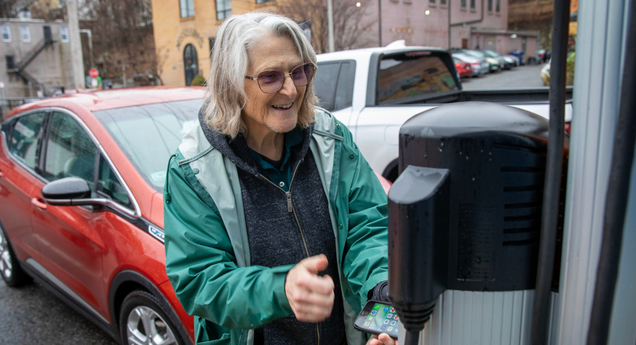WBUR: For EVs to take off, Boston needs more equitable placement of chargers

By Paula Moura, Photo: Robin Lubbock/WBUR
To produce this story, WBUR partnered with the Visualizing Energy project at the Boston University Institute for Global Sustainability and the Justice Media Computational Journalism co-Lab, a collaboration between the Faculty of Computing & Data Sciences’ BU Spark! program, the College of Communication, and the BU Hub Cross-College Challenge. Contributing students were Tobin Gedstad, Emma Glassman-Hughes, Imandi Herath, Melina Nguyen, Ashley Soebroto, Karri, Vaishnavi, Michelle Voong, Artemis Huang, Weining Mai, Sukanya Mitra, Arin Wang and Kaiyan Xu, with assistance from professors Brooke Williams and Langdon White.
Nicole Mushero bought her Chevy Bolt a year-and-a-half ago to do her small part to tackle climate change. But she lives in a condo in Jamaica Plain without an easy way to install a electric vehicle charger.
She said there’s only one public charging station within walking distance to her home — with Level 2 chargers that can take up to 10 hours to recharge — and the spots fill up fast. So Mushero got up early on a Saturday to snag a spot; when she arrived at 9 a.m., she got the last available plug.
“There really needs to be a lot more charging stations to support that need that already exists, never mind that we want to grow,” Mushero said.
Currently, most EV charging happens at home. But people who can’t afford to install an EV charger, don’t have a driveway, or rent a home without a charger will have to rely on public charging.
Boston has pledged to make sure every household is “within a 10-minute walk of an EV car-share facility or a publicly accessible charging station by 2040.” And by 2025, Boston is aiming for 1,055 Level 2 plugs and 320 DC fast chargers, which take about 20 minutes to an hour to charge to 80%.